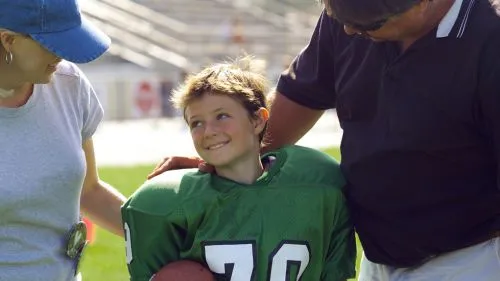As a mental performance coach, I work with athletes of all ages—from youth players to college and professionals. And one of the most common questions I get from parents is this:
“How can I help my child mentally when it comes to sports?”
Whether your athlete is in middle school, high school, or even playing in college, the role you play as a parent is incredibly influential—not just in terms of their performance, but how they think, feel, and grow through sports.
In this article, I’m going to break down four practical and powerful ways you can support your athlete’s mental game.
Shift from Outcome Goals to Process Goals
One of the first areas I work on with athletes—and something parents can help with—is goal setting.
Often, we default to outcome-based goals: “Score 20 points,” “Get two hits,” or “Win the game.” These can feel motivating at first, but for anxious or perfectionist athletes, they often backfire.
Here’s why: outcome goals are out of their direct control. When players focus too much on the result, fear and pressure creep in. Thoughts like:
- “What if I don’t get that hit?”
- “What if I let my parents down?”
- “What if my stats drop?”
Instead, help your athlete set controllable, process-focused goals.
For example, if your child is a baseball player who wants to get hits, help them reverse engineer that goal:
- What puts them in a position to get a hit?
- Good at-bats.
- How do they have good at-bats?
- Time the pitcher in the on-deck circle and be aggressive at the plate.
So the actual game-day goals become:
- Time up the pitcher.
- Be aggressive at the plate.
These goals are fully within their control and keep their mind focused on the right things.
This shift is especially important if your athlete already deals with fear of failure, pressure from coaches, or high self-imposed expectations. Process goals help reduce anxiety and build confidence—because they allow athletes to succeed at the things they can control.
Use Post-Game Evaluation to Build Confidence & Resilience
The second key area is how you talk to your athlete after games.
Naturally, most athletes dwell on their mistakes. And if they’re already feeling down after a poor performance, a parent focusing on what went wrong only reinforces their frustration.
Instead, guide them through a healthy evaluation process:
- Step One: Ask, “What were some positives from today’s game?”
- Did they stay aggressive?
- Did they bounce back from mistakes?
- Were they a good teammate?
Even if their stats don’t reflect a great performance, these small wins build mental toughness.
- Step Two: Ask, “What’s one thing you can improve or learn from today?”
- Not from a place of criticism, but from growth.
Help your athlete shift their mindset from judgment to curiosity. Every mistake becomes an opportunity to learn. And every success—even small ones—becomes a deposit into their confidence bank.
Encourage an Improvement Mindset Over a Perfection Mindset
One of the most damaging beliefs athletes can develop is that they need to be perfect to succeed.
And while parents want their kids to play their best, unknowingly we can fuel this perfectionism by placing too much emphasis on flawless execution.
Instead, encourage what I call an “improving mindset.”
This means:
- Focus on effort over outcome.
- Embrace mistakes as part of the process.
- Reinforce the idea that growth happens over time—not in a single game.
Your athlete doesn’t need to be perfect today. They just need to give it their best. When they start to believe that, pressure lifts, and they play more freely.
Practical ways to support this:
- Ask: “How can you get better this week?”
- Say: “What part of your game are you going to improve on?”
- Avoid: “Your shot didn’t look great today.”
- Replace with: “How can we work on your shot this week?”
Your language becomes their inner voice. Speak to them in a way that encourages growth, not judgment.
Teach the Link Between Thoughts and Performance
The final tip is to help your athlete understand the connection between their thinking and how they play.
Athletes with anxious, critical, or fear-based thinking tend to:
- Play scared
- Second-guess themselves
- Lose composure
On the other hand, athletes with confident, process-focused thinking:
- Stay calm under pressure
- Bounce back from mistakes
- Play with freedom
One of the most powerful conversations you can have is simply asking:
- When you’re thinking positively, how do you play?
- When you’re worried about messing up or what others think, how do you play?
Helping your athlete become more aware of their self-talk opens the door to change. And as a parent, you model this by the way you speak to them.
Final Thoughts
These four tips can have a tremendous impact on your athlete’s mental performance:
- Focus on process-based goals instead of outcome-based goals.
- Use positive post-game evaluations to build confidence.
- Promote an improvement mindset over perfectionism.
- Teach the connection between thoughts and performance.
And if you’d like help implementing these strategies, I offer a 12-week 1-on-1 mental performance coaching program for athletes.
I’ve also created two online courses:
And if you’re more of a reader, check out my books:
Thank you for reading and I wish you the best of success in all that you do.




